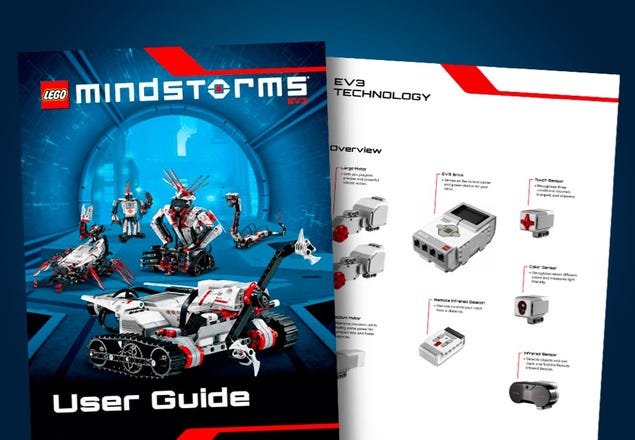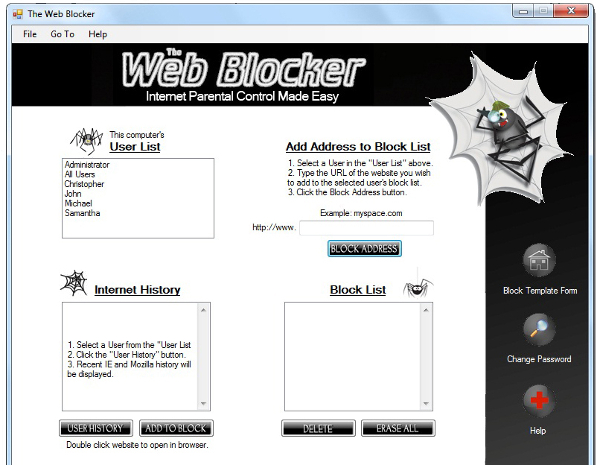You can extract the compiled program from the EV3. Compiled programs have a.rbf file extension. However, these files only contain EV3 VM bytecodes and cannot be converted back to the EV3-G project file format (.ev3p file extension). Details about extracting the program from the brick and what you can do with it has already been answered here. EV3 SOFTWARE BLOCK DOWNLOAD (PC/MAC) Energy Meter Block Gyro Sensor Block Sound Sensor Block Temperature Sensor Block Ultrasonic Sensor Block. LEGO MINDSTORMS EV3 File Edit Project. x Program x Program2 x Tool Help Sound Editor Image Editor My Block. To get the retail version of the EV3 software. Sensors it describes, step by step, how to add the Sensor blocks. One quick hint, here is a direct link to the Sensor Blocks download at Lego.com. The sensor blocks are about halfway down the page. Good luck and have fun programming.
The EV3 Programming app is an addition to the LEGO MINDSTORMS Education EV3 learning concept that supports teachers with an intuitive technology platform and manageable, curriculum-relevant lessons. The EV3 app gives you real-life robotic technology in a simple, mobile and relevant solution for the digital classroom.
At the EV3 programming clinic, people were asking how to get the Gyro sensor block. The Education edition should already have the gyro sensor block, the retail version does not.
To get the retail version of the EV3 software, visit http://www.lego.com/en-us/mindstorms/downloads/download-software . Then at Robot Square – Adding Sensors it describes, step by step, how to add the Sensor blocks. One quick hint, here is a direct link to the Sensor Blocks download at Lego.com. The sensor blocks are about halfway down the page.
Good luck and have fun programming
Are you looking for a way to enable your students to program a LEGO robot without access to the hardware? Here's a summary of some of the most popular and accessible EV3 emulators and virtual environments currently available, including both free and licensed software products. They range from open-ended tools that come with no agenda about how they are to be used through to highly-structured, curriculum-aligned activities.

CoderZ
Cost: By quote (* see note below)
CoderZ is an online learning environment for students to learn coding with a block-based programming language and a virtual 3D robot simulation. It's structured around a series of gamified missions that provide over 15 hours of curriculum, activities, and assignments.
Features include:
- Block coding
- Runs in a browser, so no install needed
- Consists of a series of guided missions
- Teachers can create classes and monitor student progress
- Offers an online coding tournament where classes compete virtually.
*Note: Amazon Future Engineer offers free online virtual robotics & coding classes for any student or teacher affected by COVID-19 in the US, Canada, Argentina, Colombia and Chile. For more information, visit: https://play.gocoderz.com/lp/amazon/
EV3DevSim
Cost: Free
DevSim enables students to write Python programs for a virtual EV3 robot. The same programs can be used on a physical EV3 robot running ev3dev.
Features include:
- Python programming
- Runs in a browser, so no install needed
- A variety of maps are available for testing
- Versatile robot and map configuation
- Extensive tutorials.
Gears
Cost: Free
From the creator of EV3DevSim, Gears is a newer and more capable simulator that supports Blockly and Python. Generated Python code can run on a physical EV3 robot running ev3dev or Pybricks.
Features include:
- Blockly or Python programming
- Runs in a browser, no login or accounts needed
- Many built in challenges and missions, or upload your own image to use as a map
- Realistic 3D physics simulation (eg. the robot won't run straight without the help of a gyro)
- Use one of the many built-in robots or configure your own.
MakeCode for EV3
Cost: Free
MakeCode for EV3 is a browser-based programming environment that enables students to program a physical robot or a simulated EV3 brick.The simulator enables to students to test and debug their programs interactively. They can precisely control sensor input values and get immediate feedback about what's happening with the motors and the display.
Features include:
- Program in drag-and-drop block coding, JavaScript text programming, or switch between them
- Runs in a browser, so no install needed
- Program a real EV3 brick or a virtual one using the interactive simulator
- Extensive tutorials.
Open Roberta Lab
Cost: Free Android data recovery software free. download full version for mac.
Open Roberta Lab enables students to write programs for a virtual EV3 robot using a block-based programming language.The same programs can be used on a physical EV3 robot running ev3dev.
Features include:

- Block coding
- Runs in a browser, so no install needed
- A number of maps are available
- The simulator is relatively versatile, allowing the user to move the robot and obstacle around the map while the program is running
- Robot configuration can be adjusted
- Provides good feedback about the robot's sensor values.
QEV3Bot Simulator
Cost: Free
QEV3Bot Simulator is a free Windows-based LEGO EV3 simulator. QEV3BotSim allows the user to configure the connection of up to four sensors chosen from the set of eight available sensors mounted on the robot.
Features include:
- RobotC text programming
- Runs on Windows
- EV3 brick emulator.
Robot Virtual Worlds
Cost: Starts at $49 for single seat, or $299 for 30 seats for 365 days.
Carnegie Mellon University's Robot Virtual Worlds simulates robots in 3D environments using RobotC and enables students to program virtual or physical robots.
Features include:
- RobotC text programming
- Runs on Windows 7, 8/8.1, or 10
- EV3 brick emulator
- A level builder enables you to build your own virtual worlds and import existing 3D models (*.stl files)
- A selection of curriculum packs are available.
Virtual Robotics Toolkit
Cost: $65 perpetual / $50 subscription per seat
Cogmation's Virtual Robotics Toolkit (VRT) is a highly-configurable and incredible versatile simulator that provides an experience that is a close match to the physical experience. Because it complements the EV3 Software rather than introducing an entirely new programming language, the VRT enables students to switch between virtual and physical programming.
Features include:
- Requires EV3 Software
- Runs on Mac OS X or Windows
- EV3 brick emulator
- Wide variety of virtual environments, including FLL and WRO competiton mats
- Highly configurable virtual robot
- Import custom robot models from free CAD tools such as LEGO Digital Designer
- Promotes collaboration through sharing virtual robots and sample code
- Configurable physics engine enables exploration of physical forces e.g. friction, gravity.

CoderZ
Cost: By quote (* see note below)
CoderZ is an online learning environment for students to learn coding with a block-based programming language and a virtual 3D robot simulation. It's structured around a series of gamified missions that provide over 15 hours of curriculum, activities, and assignments.
Features include:
- Block coding
- Runs in a browser, so no install needed
- Consists of a series of guided missions
- Teachers can create classes and monitor student progress
- Offers an online coding tournament where classes compete virtually.
*Note: Amazon Future Engineer offers free online virtual robotics & coding classes for any student or teacher affected by COVID-19 in the US, Canada, Argentina, Colombia and Chile. For more information, visit: https://play.gocoderz.com/lp/amazon/
EV3DevSim
Cost: Free
DevSim enables students to write Python programs for a virtual EV3 robot. The same programs can be used on a physical EV3 robot running ev3dev.
Features include:
- Python programming
- Runs in a browser, so no install needed
- A variety of maps are available for testing
- Versatile robot and map configuation
- Extensive tutorials.
Gears
Cost: Free
From the creator of EV3DevSim, Gears is a newer and more capable simulator that supports Blockly and Python. Generated Python code can run on a physical EV3 robot running ev3dev or Pybricks.
Features include:
- Blockly or Python programming
- Runs in a browser, no login or accounts needed
- Many built in challenges and missions, or upload your own image to use as a map
- Realistic 3D physics simulation (eg. the robot won't run straight without the help of a gyro)
- Use one of the many built-in robots or configure your own.
MakeCode for EV3
Cost: Free
MakeCode for EV3 is a browser-based programming environment that enables students to program a physical robot or a simulated EV3 brick.The simulator enables to students to test and debug their programs interactively. They can precisely control sensor input values and get immediate feedback about what's happening with the motors and the display.
Features include:
- Program in drag-and-drop block coding, JavaScript text programming, or switch between them
- Runs in a browser, so no install needed
- Program a real EV3 brick or a virtual one using the interactive simulator
- Extensive tutorials.
Open Roberta Lab
Cost: Free Android data recovery software free. download full version for mac.
Open Roberta Lab enables students to write programs for a virtual EV3 robot using a block-based programming language.The same programs can be used on a physical EV3 robot running ev3dev.
Features include:
- Block coding
- Runs in a browser, so no install needed
- A number of maps are available
- The simulator is relatively versatile, allowing the user to move the robot and obstacle around the map while the program is running
- Robot configuration can be adjusted
- Provides good feedback about the robot's sensor values.
QEV3Bot Simulator
Cost: Free
QEV3Bot Simulator is a free Windows-based LEGO EV3 simulator. QEV3BotSim allows the user to configure the connection of up to four sensors chosen from the set of eight available sensors mounted on the robot.
Features include:
- RobotC text programming
- Runs on Windows
- EV3 brick emulator.
Robot Virtual Worlds
Cost: Starts at $49 for single seat, or $299 for 30 seats for 365 days.
Carnegie Mellon University's Robot Virtual Worlds simulates robots in 3D environments using RobotC and enables students to program virtual or physical robots.
Features include:
- RobotC text programming
- Runs on Windows 7, 8/8.1, or 10
- EV3 brick emulator
- A level builder enables you to build your own virtual worlds and import existing 3D models (*.stl files)
- A selection of curriculum packs are available.
Virtual Robotics Toolkit
Cost: $65 perpetual / $50 subscription per seat
Cogmation's Virtual Robotics Toolkit (VRT) is a highly-configurable and incredible versatile simulator that provides an experience that is a close match to the physical experience. Because it complements the EV3 Software rather than introducing an entirely new programming language, the VRT enables students to switch between virtual and physical programming.
Features include:
- Requires EV3 Software
- Runs on Mac OS X or Windows
- EV3 brick emulator
- Wide variety of virtual environments, including FLL and WRO competiton mats
- Highly configurable virtual robot
- Import custom robot models from free CAD tools such as LEGO Digital Designer
- Promotes collaboration through sharing virtual robots and sample code
- Configurable physics engine enables exploration of physical forces e.g. friction, gravity.
Last updated: July 24, 2020
Ev3 Mac Download
The following two tabs change content below.Autocad Block Download
Ev3 Software Block Download (pc/mac) Windows 7
- Obstacle Course - 26 August 2020
- Crash Test Dummy - 26 August 2020
- The Wave - 21 May 2020

